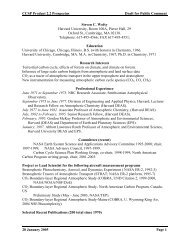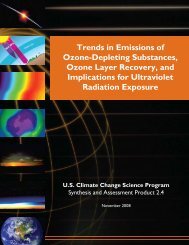Decision support experiments and evaluations using seasonal to ...
Decision support experiments and evaluations using seasonal to ...
Decision support experiments and evaluations using seasonal to ...
You also want an ePaper? Increase the reach of your titles
YUMPU automatically turns print PDFs into web optimized ePapers that Google loves.
The U.S. Climate Change Science Program<br />
Much more needs<br />
<strong>to</strong> be known about<br />
how <strong>to</strong> make<br />
decision makers<br />
aware of their<br />
possible vulnerability<br />
from climate<br />
variability impacts<br />
<strong>to</strong> water resources.<br />
138<br />
do not have the same access or the consequent<br />
ability <strong>to</strong> respond (Hartmann, 2001). This is<br />
especially true where there are no alternatives <strong>to</strong><br />
private competitive markets where asymmetries<br />
of economic buying power may affect information<br />
access. Scientific information that is not<br />
properly disseminated can inadvertently result<br />
in windfall profits for some <strong>and</strong> disadvantage<br />
others (Pfaff et al., 1999; Broad <strong>and</strong> Agrawalla,<br />
2000; Broad et al., 2002). Access <strong>and</strong> equity issues<br />
also need <strong>to</strong> be explored in more detail.<br />
4.5.1 Underst<strong>and</strong>ing <strong>Decision</strong>-Makers’<br />
Perceptions of Climate Vulnerability<br />
Much more needs <strong>to</strong> be known about how <strong>to</strong><br />
make decision makers aware of their possible<br />
vulnerability from climate variability impacts<br />
<strong>to</strong> water resources. Research on the influence of<br />
climate science on water management in western<br />
Australia, for example, (Power et al., 2005)<br />
suggests that water resource decision makers<br />
can be persuaded <strong>to</strong> act on climate variability<br />
information if a strategic program of research<br />
in <strong>support</strong> of specific decisions (e.g., extended<br />
drought) can be wedded <strong>to</strong> a dedicated, timely<br />
risk communication program.<br />
While we know, based on research in specific<br />
applications, that managers who find climate<br />
forecasts <strong>and</strong> projections <strong>to</strong> be reliable may be<br />
more likely <strong>to</strong> use them, those most likely <strong>to</strong> use<br />
weather <strong>and</strong> climate information are individu-<br />
als who have experienced weather <strong>and</strong> climate<br />
problems in the recent past. The implication of<br />
this finding is that simply delivering weather<br />
<strong>and</strong> climate information <strong>to</strong> potential users<br />
may be insufficient in those cases in which<br />
the manager does not perceive climate <strong>to</strong> be a<br />
hazard—at least in humid, water-rich regions of<br />
the United States that we have studied 5 .<br />
We also need <strong>to</strong> know more about how the financial,<br />
regula<strong>to</strong>ry, <strong>and</strong> management contexts<br />
influence perceptions of usefulness (Yarnal et<br />
al., 2006; Dow et al., 2007). Experience suggests<br />
that individual responses, in the aggregate, may<br />
have important impacts on one’s capacity <strong>to</strong> use,<br />
access, <strong>and</strong> interpret information. Achieving<br />
a better underst<strong>and</strong>ing of these fac<strong>to</strong>rs <strong>and</strong> of<br />
the informational needs of resource managers<br />
will require more investigation of their working<br />
environments <strong>and</strong> intimate underst<strong>and</strong>ing of<br />
their organizational constraints, motivations,<br />
<strong>and</strong> institutional rewards.<br />
4.5.2 Possible Research Methodologies<br />
Case studies increase underst<strong>and</strong>ing of how<br />
decisions are made by giving specific examples<br />
of decisions <strong>and</strong> lessons learned. A unique<br />
5 Additional research on water system manager<br />
perceptions is needed, in regions with varying hydrometeorological<br />
conditions, <strong>to</strong> discern if this finding is<br />
universally true.<br />
Chapter 4




